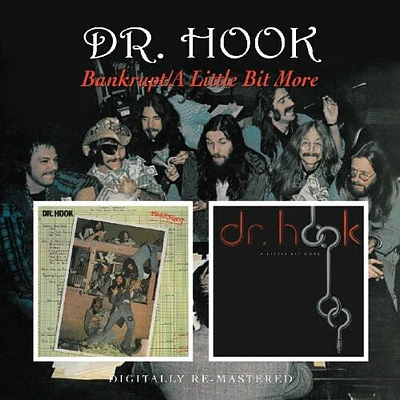Home
Bankrupt!
Loading Inventory...
Barnes and Noble
Bankrupt!
Current price: $11.99


Barnes and Noble
Bankrupt!
Current price: $11.99
Loading Inventory...
Size: CD
*Product Information may vary - to confirm product availability, pricing, and additional information please contact Barnes and Noble
Somewhat sneakily, as they honed their blend of new wave, synth pop, soft rock, and all things '80s for the better part of a decade,
Phoenix
became one of the most influential acts of the 2000s and 2010s. When they married that distinctive style to some of their strongest songs on 2009's
Wolfgang Amadeus Phoenix
, that album's mainstream success felt like a well-earned reward for their years of defining a sound that had permeated a lot of pop culture. Its follow-up,
Bankrupt!
, isn't nearly as devoid of new ideas as its title suggests, but it doesn't feel like quite the leap forward
Wolfgang
was compared to what came before it. Not that it necessarily needs to be;
sound more comfortable and confident than ever on songs like the lead single, "Entertainment," which defines almost everything that they do on the rest of the album with its galloping beats, earnest vocals, and Asian-tinged keyboard melodies. "Trying to Be Cool," "Don't," and "Oblique City" also carry over the bouncy irresistibility of the band's breakthrough, and even if they don't have the star-making power that "1901" and "Lisztomania" did, they reveal
's deep love and even deeper knowledge of '80s pop magic in their deft major-to-minor key changes and strategically placed buildups and breakdowns. These little touches help the band stand out among its like-minded contemporaries, and it helps that
have been drawing inspiration from the '80s longer than that decade actually existed (the fact that they mixed
on the console used in the making of
Michael Jackson
's
Thriller
might have contributed some good '80s karma as well). Elsewhere, they pay lip service to another of that decade's icons with "Drakkar Noir," and the way
Thomas Mars
pronounces it almost makes the overbearing cologne cool again. Here and on "The Real Thing," the band ponders and crosses the line between real and fake, taking it to new levels on "S.O.S. in Bel Air," which could reignite the debate between
Strokes
and
fans over who copied who first (and who does it better). Later on, things get interesting -- particularly for longtime fans -- when the band indulges its experimental side on songs like the seven-minute title track, which prefaces
Mars
' vocals with a lengthy stretch of baroque keyboards, and the expansive melancholy of "Chloroform" and "Bourgeois." Even if moments like these aren't exactly in keeping with the sound that broke
, they're a reminder that the bandmembers ultimately became popular by being themselves.
lets them celebrate with a victory lap that's enjoyable for all concerned. ~ Heather Phares
Phoenix
became one of the most influential acts of the 2000s and 2010s. When they married that distinctive style to some of their strongest songs on 2009's
Wolfgang Amadeus Phoenix
, that album's mainstream success felt like a well-earned reward for their years of defining a sound that had permeated a lot of pop culture. Its follow-up,
Bankrupt!
, isn't nearly as devoid of new ideas as its title suggests, but it doesn't feel like quite the leap forward
Wolfgang
was compared to what came before it. Not that it necessarily needs to be;
sound more comfortable and confident than ever on songs like the lead single, "Entertainment," which defines almost everything that they do on the rest of the album with its galloping beats, earnest vocals, and Asian-tinged keyboard melodies. "Trying to Be Cool," "Don't," and "Oblique City" also carry over the bouncy irresistibility of the band's breakthrough, and even if they don't have the star-making power that "1901" and "Lisztomania" did, they reveal
's deep love and even deeper knowledge of '80s pop magic in their deft major-to-minor key changes and strategically placed buildups and breakdowns. These little touches help the band stand out among its like-minded contemporaries, and it helps that
have been drawing inspiration from the '80s longer than that decade actually existed (the fact that they mixed
on the console used in the making of
Michael Jackson
's
Thriller
might have contributed some good '80s karma as well). Elsewhere, they pay lip service to another of that decade's icons with "Drakkar Noir," and the way
Thomas Mars
pronounces it almost makes the overbearing cologne cool again. Here and on "The Real Thing," the band ponders and crosses the line between real and fake, taking it to new levels on "S.O.S. in Bel Air," which could reignite the debate between
Strokes
and
fans over who copied who first (and who does it better). Later on, things get interesting -- particularly for longtime fans -- when the band indulges its experimental side on songs like the seven-minute title track, which prefaces
Mars
' vocals with a lengthy stretch of baroque keyboards, and the expansive melancholy of "Chloroform" and "Bourgeois." Even if moments like these aren't exactly in keeping with the sound that broke
, they're a reminder that the bandmembers ultimately became popular by being themselves.
lets them celebrate with a victory lap that's enjoyable for all concerned. ~ Heather Phares

















